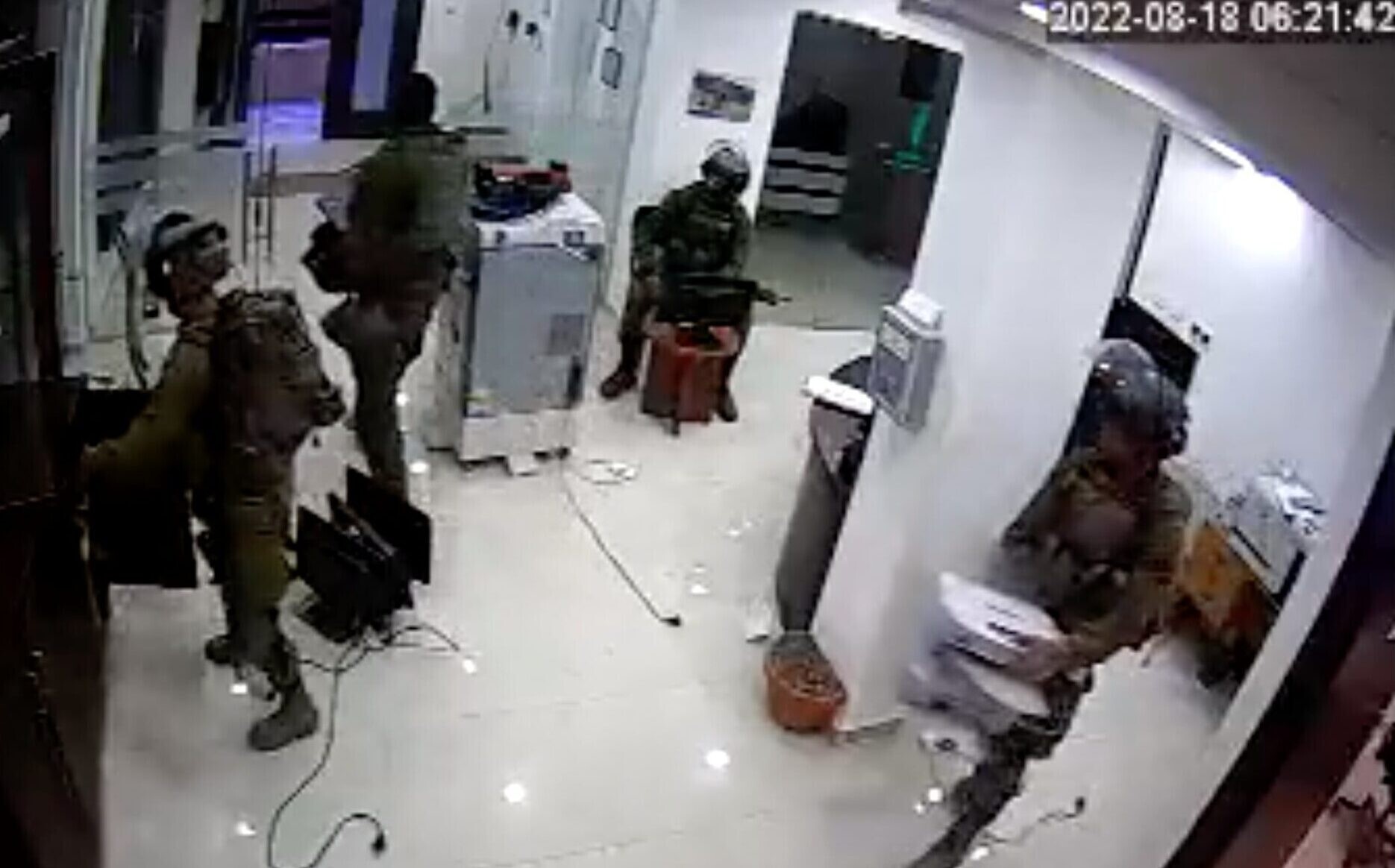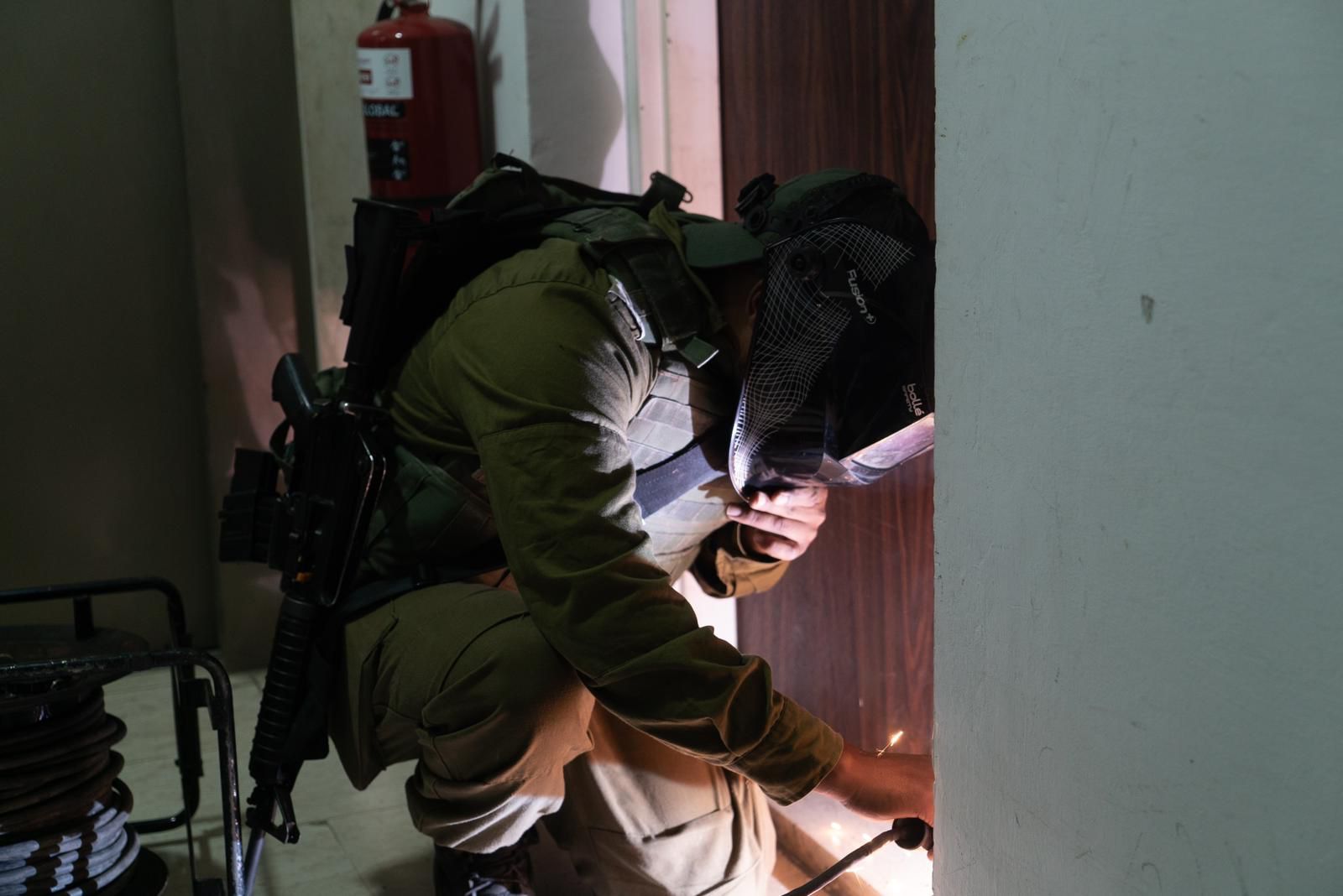The United Nations said Thursday that Israel’s raids on the offices of seven Palestinian human rights organizations in the West Bank earlier in the day “cannot be taken lightly” and called for the protection of civil society groups.
Israeli troops raided the offices around Ramallah, sealing entrance doors and leaving notices declaring them closed. Last year, Israel designated the organizations as terror groups, saying they effectively operate as an arm of the Popular Front for the Liberation of Palestine terrorist organization.
The groups deny the terror charges and accuse Israel of trying to silence criticism and alleged human rights abuses.
A UN spokesperson said Thursday that the UN was “studying” the Israeli raids, and that the world body had expressed concern last year after Israel’s designation of the groups as terror organizations.
“It needs to be underscored, in every country, that the authorities need to take particular care to make sure that human rights groups and civil society organizations can go about their work without hindrance,” Farhan Haq, Deputy Spokesman for the UN secretary-general, said in response to the raids.
Get The Times of Israel's Daily Edition by email and never miss our top stories
The UN will look at the charges that prompted the Israeli actions against the Palestinian groups, he said.
“Those are actions that cannot be taken lightly, so it would take quite a bit to convince us of what was at issue,” Haq said. “It remains to be seen what the details are behind these charges.”
“The main thing that needs to be done is to make sure that there’s no targeting of groups for their human rights work,” he said.
Earlier Thursday, the UN Human Rights Office said the closures “appear totally arbitrary” and accused Israel of not providing evidence to support claims the organizations conducted unlawful activities.
“Human rights defenders must be immediately protected from these unjustified attacks,” the office said.

Security camera footage of Israeli troops raiding the offices of Union of Agricultural Work Committees in Ramallah on August 16, 2022. (Screen capture/Twitter)
Also Thursday, the US expressed concern over the raids and said it has decided to not follow Jerusalem’s lead in blacklisting the groups after receiving Israeli intelligence on the organizations last year.
US State Department spokesman Ned Price refrained from condemning Israel, but said the US had reached out to Israel at senior levels “for more information regarding the basis for these closures.” He said Israel has pledged to provide the US with intelligence regarding the raids.
Price confirmed that Washington did not view the intelligence previously conveyed by Israel as convincing enough for the US to blacklist the Palestinian groups.
“Through the course of our review of this information, we have not changed our position on or our approach to these particular organizations,” Price said. “Different parties can read information differently, can perceive threats differently.”
“We have conveyed the message that there must be a very high bar to take action against civil society organizations. Our Israeli partners have in turn conveyed back to us that they have met that high bar,” Price said.
Israel’s Defense Ministry blacklisted six of the civil society groups in October 2021, putting their employees at risk of arrest and their funding at risk of seizure. Israel has claimed it has “ironclad” intelligence tying the groups to the Popular Front for the Liberation of Palestine, which Israel and the US have labeled as a terror organization.
Israel has only been willing to share that intelligence privately, and several Democratic lawmakers, as well as European Union officials privy to the information, concluded that it was not sufficient to justify the terror label.
The terror designation last year sparked a swift backlash around the globe, with the European Union, the Palestinian Authority, progressive US Democrats, US Jewish groups and international human rights organizations expressing criticism.

An Israeli soldier welds a door shut, in the West Bank city of Ramallah, August 18, 2022. Israeli troops operated against several Palestinian rights organizations it has declared as terror groups. (Israel Defense Forces)
The six blacklisted organizations — al-Haq, Addameer, the Union of Agricultural Work Committees, Defense for Children International-Palestine, Bisan, and the Union of Palestinian Women’s Committees — are prominent, well-established groups.
Most of the organizations have documented alleged human rights violations by Israel as well as the Palestinian Authority. Many have received considerable funding in grants from EU member states and the United Nations, among other donors, but not the US.
On Wednesday, Defense Minister Benny Gantz ratified the 2021 decision to blacklist the Union of Palestinian Women’s Committees, the Bisan Research and Advocacy Center, and Addameer, which represents Palestinian security prisoners in Israeli military courts.
Separately, the chief of the Israel Defense Forces’ Central Command denied appeals by Al-Haq and Defense for Children-International in Palestine to be removed from the terror list.
The sixth organization, the Union of Agricultural Work Committees, also remained listed as linked to the Popular Front for the Liberation of Palestine.
The IDF said on Thursday it raided and shuttered the offices of all six groups along with a seventh, the Health Work Committees.
The Defense Ministry claimed that the organizations in question “operate under cover for the PFLP” and work “under the guise of performing humanitarian activities to further the goals of the PFLP terror organization.”
Both Israeli military and civilian law ban supporting or joining a terror group, and violators can face years in prison. Israeli authorities can also seize assets belonging to terror organizations and forbid funding their activities; donors may also be subject to significant jail time.
Israeli authorities have charged before that the PFLP has pilfered millions of euros from civil society organizations affiliated with its members to fund terrorist activities.


